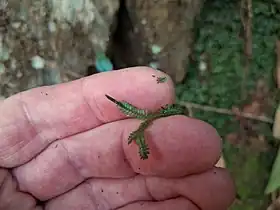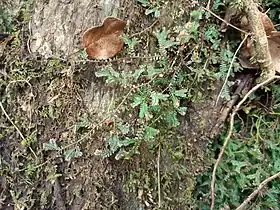| Selaginella australiensis | |
|---|---|
 | |
| Scientific classification | |
| Kingdom: | Plantae |
| Clade: | Tracheophytes |
| Clade: | Lycophytes |
| Class: | Lycopodiopsida |
| Order: | Selaginellales |
| Family: | Selaginellaceae |
| Genus: | Selaginella |
| Species: | S. australiensis |
| Binomial name | |
| Selaginella australiensis | |
| Synonyms[3] | |
| |
Selaginella australiensis is a plant in the spikemoss family Selaginellaceae endemic to northeastern Queensland. It grows in rainforest and closed forest from Cooktown to near Mission Beach, including the Atherton Tablelands. It is a low growing and much branched terrestrial plant inhabiting damp shady locations, typically along stream banks.[4][5]
Conservation
This species is listed by the Queensland Department of Environment and Science as least concern.[1] As of 8 January 2023, it has not been assessed by the IUCN.
Gallery
References
- 1 2 "Species profile—Selaginella australiensis". Queensland Department of Environment and Science. Queensland Government. 2022. Retrieved 8 January 2023.
- ↑ "Selaginella australiensis". Australian Plant Name Index (APNI). Centre for Plant Biodiversity Research, Australian Government. Retrieved 8 January 2023.
- 1 2 "Selaginella australiensis Baker". Plants of the World Online. Royal Botanic Gardens, Kew. Retrieved 8 January 2023.
- ↑ Jermy, A.C.; Holmes, J.S. (2022). Wheeler, A.M. (ed.). "Selaginella australiensis". Flora of Australia. Australian Biological Resources Study, Department of Agriculture, Water and the Environment: Canberra. Retrieved 8 January 2023.
- ↑ A.R.Field; C.J.Quinn; F.A.Zich (2022). "Selaginella australiensis". Australian Tropical Ferns and Lycophytes. Australian Tropical Herbarium, Cairns; Australian Biological Resources Study, Canberra. Retrieved 8 January 2023.
External links
 Data related to Selaginella australiensis at Wikispecies
Data related to Selaginella australiensis at Wikispecies Media related to Selaginella australiensis at Wikimedia Commons
Media related to Selaginella australiensis at Wikimedia Commons- View a map of historical sightings of this species at the Australasian Virtual Herbarium
- View observations of this species on iNaturalist
- View images of this species on Flickriver
This article is issued from Wikipedia. The text is licensed under Creative Commons - Attribution - Sharealike. Additional terms may apply for the media files.


